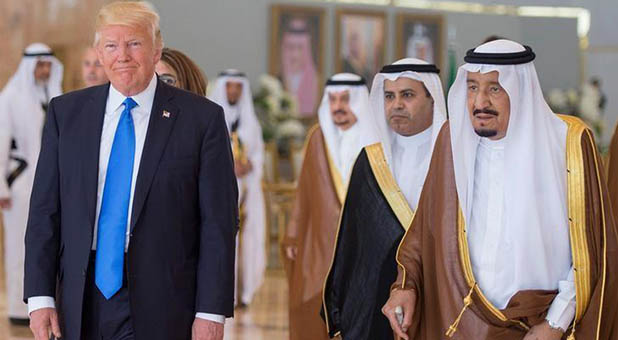Can President Trump’s ‘Outside-in’ Middle East Gambit Work?
Much of the attention being given to President Donald Trump’s visit to the Middle East has focused on whether his first foreign trip will provide much of a distraction from his growing domestic troubles. But the real substance centers on his plan to solve a problem that has eluded all of his predecessors: the conflict between Israel and the Palestinians.
The key to Trump’s foray is an effort to forge an “outside-in” breakthrough, in which bilateral talks will be shelved in favor of an attempt to use the leverage of Saudi Arabia and other Sunni Arab nations over the Palestinians to forge a pact with Israel. But the problem is that, like other peace plans, it seeks to finesse the main obstacle to peace rather than to confront it. As long as Palestinian national identity is inextricably linked to their war on Zionism, this effort will fail as miserably as its predecessors.
Though Israel is often portrayed in the press as isolated, the government of Prime Minister Benjamin Netanyahu has actually made substantial progress in its outreach efforts. The most remarkable diplomatic breakthrough involves some of Israel’s most bitter Arab foes, such as Saudi Arabia, becoming tacit allies.
Netanyahu doesn’t deserve credit for this, since the Saudis have been looking for a way out of the dead-end conflict with Israel for years and were pushed into the arms of the Israelis by President Barack Obama’s efforts to appease Iran. But however favorably Arab governments have come to view Israel, their populations are still being raised on anti-Semitic incitement against Jews. They can’t formalize their ties with Israel so long as the Palestinians still seek the Jewish state’s destruction to the cheers of the Arab street.
That’s why many serious people believe the Saudis, Egyptians and Jordanians can supply the diplomatic muscle to finally push the Palestinians to take yes for an answer and end the conflict. Since it is clearly in the interests of these nations to remove the one barrier to better relations with a Jewish state that they view as a security and economic partner, they hope to convince the Palestinians that peace with Israel will be beneficial for them too.
That’s a logical concept, but if common sense determined the course of Middle East history, the Arabs would have embraced the Jewish state decades ago.
Still, Trump’s effort is not based entirely on the delusions that led Obama to believe pressure on Israel would convince the Palestinians to meet him halfway. As The Wall Street Journal reported, the Saudis and other Gulf nations are putting forward a scheme in which they would make strides toward normalizing relations with Israel in exchange for Netanyahu enacting a partial settlement freeze in the West Bank and entering talks with the Palestinian Authority.
This is a far cry from the blind faith that some in the U.S. foreign policy establishment have in the idea that the 2002 Saudi peace initiative is a game-changer. In theory, that plan called for complete Arab recognition for Israel in exchange for a complete withdrawal to the pre-1967 lines. But what the Arab states are offering may actually be a way for them to sideline the Palestinians and avoid dead-end peace talks rather than to jump-start them.
The Saudis understand that no matter how much money they give the Palestinians, any negotiation that depends on the Fatah and Hamas movements being willing to recognize the legitimacy of a Jewish state and ending the conflict will ultimately founder. Nor are Sunni nations thrilled with the idea of creating yet another unstable Arab state that might fall under the influence of Islamist terrorists and/or the Iranians. What they may really want is not so much the real estate deal of the century that Trump dreams about, but an effort to keep the conflict under control. That’s why the Saudis are asking for a lot less from Israel than the peace processors thought. Like Netanyahu, they may want to manage an unsolvable conflict rather than a pyrrhic quest to end it.
Israel has good reason to do what it can to work with the Saudis. But the idea that the “outside-in” concept will transform Trump into the prince of peace is a pipe dream. Let’s hope the president won’t let his ambition to achieve a deal—one that must await a sea change in Palestinian political culture that is nowhere in sight—get in the way of a less grandiose effort that makes sense. {eoa}
Jonathan S. Tobin is opinion editor of JNS.org and a contributing writer for National Review.
This article was originally published at JNS.org. Used with permission.
















































